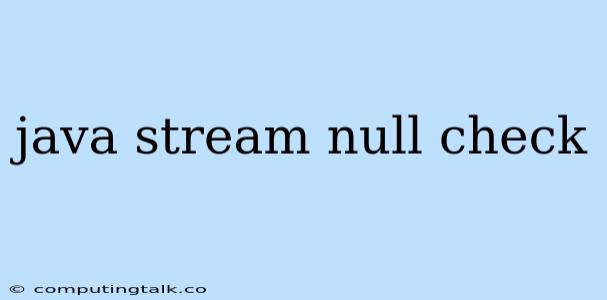Java streams are a powerful feature for processing collections of data. However, when working with potentially null values, you need to be careful to avoid NullPointerExceptions. Here's how to safely handle nulls in your Java streams.
Understanding the Problem
Java streams are designed to work with collections, and they assume that the elements in those collections are non-null. If you try to operate on a stream containing null values, you'll likely encounter a NullPointerException.
Here's a simple example:
List names = Arrays.asList("Alice", null, "Bob");
// This code will throw a NullPointerException
names.stream().map(name -> name.toUpperCase()).collect(Collectors.toList());
In this example, the map operation will fail when it encounters the null element in the names list.
Handling Null Values with Optional
The Optional class, introduced in Java 8, is a powerful tool for representing the potential absence of a value. Here's how you can use Optional to handle null values in streams:
1. Filter Out Nulls:
List names = Arrays.asList("Alice", null, "Bob");
List uppercaseNames = names.stream()
.filter(Objects::nonNull) // Remove null elements
.map(name -> name.toUpperCase())
.collect(Collectors.toList());
This code uses Objects.nonNull to filter out any null elements from the stream before applying the map operation.
2. Map with Optional.ofNullable:
List names = Arrays.asList("Alice", null, "Bob");
List uppercaseNames = names.stream()
.map(name -> Optional.ofNullable(name).map(String::toUpperCase).orElse(null))
.collect(Collectors.toList());
This code uses Optional.ofNullable to wrap each element in an Optional. If the element is null, it will be an empty Optional. We then use map to apply the toUpperCase operation only to non-empty Optional instances.
3. Use Optional.orElseThrow for Error Handling:
List names = Arrays.asList("Alice", null, "Bob");
List uppercaseNames = names.stream()
.map(name -> Optional.ofNullable(name)
.map(String::toUpperCase)
.orElseThrow(() -> new IllegalArgumentException("Name cannot be null")))
.collect(Collectors.toList());
This code uses Optional.orElseThrow to throw an exception if an element is null. This allows you to handle null values in a more controlled way, preventing unexpected NullPointerExceptions.
Other Options for Null Check
While Optional is a great tool for handling null values, it might not be the best choice for every situation. Here are a few alternative approaches:
1. Default Value:
List names = Arrays.asList("Alice", null, "Bob");
List uppercaseNames = names.stream()
.map(name -> name != null ? name.toUpperCase() : "UNKNOWN")
.collect(Collectors.toList());
This code uses a ternary operator to provide a default value ("UNKNOWN") for null elements.
2. Stream.ofNullable:
List names = Arrays.asList("Alice", null, "Bob");
List uppercaseNames = names.stream()
.flatMap(name -> Stream.ofNullable(name).map(String::toUpperCase))
.collect(Collectors.toList());
This code uses Stream.ofNullable to create a stream with the element if it's not null, otherwise it will be an empty stream.
Tips for Avoiding Null Values
1. Null Check at the Source:
The best way to handle nulls in streams is to prevent them from appearing in the first place. If you have control over the data source, ensure that it doesn't produce null values.
2. Use Libraries for Optional Handling:
Libraries like Apache Commons Lang provide utility methods for handling nulls, such as StringUtils.defaultString or StringUtils.isEmpty. These can be used to simplify your code.
3. Understand Your Data:
Before processing your data with streams, understand its potential for null values. This will help you choose the most appropriate approach for handling them.
Conclusion
Handling null values in Java streams is essential for avoiding NullPointerExceptions and writing robust code. By using Optional, filtering nulls, and being mindful of your data, you can effectively address the challenge of nulls and leverage the power of streams for your Java applications.
